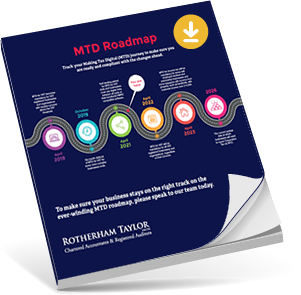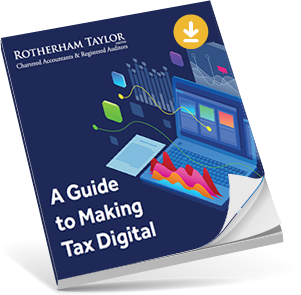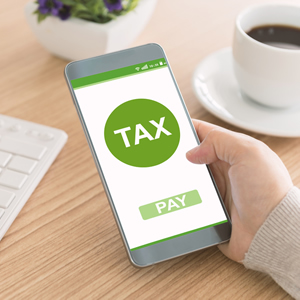Making Tax Digital (MTD) is designed to simplify the tax process for business owners.
Category Archives: Making Tax Digital
How to use the new HMRC app for your tax returns
For small businesses navigating the Making Tax Digital (MTD) for Income Tax Self-Assessment (ITSA) initiative, tax returns can be complex.Continue reading
MTD for ITSA postponed by two years
The Making Tax Digital (MTD) for Income Tax Self-Assessment (ITSA) initiative has been delayed by two years, it has been revealed.
Penalties for businesses failing to comply with Making Tax Digital
Are you signed up to Making Tax Digital for VAT? Failure to do so will result in penalties from 1 November 2022, HRMC has confirmed.
Latest deadline for Making Tax Digital for VAT comes into force imminently
A major change in the way VAT is reported comes into force from tomorrow. Every small business that charges VAT will have to file accounts through the HM Revenue & Customs (HMRC) Making Tax Digital (MTD) system.
Businesses that do not use MTD for VAT make more errors than those that do, study reveals
Small and medium-sized enterprises (SMEs) that do not use Making Tax Digital (MTD) for VAT make more errors than those that do, a major study has revealed.
Making Tax Digital – what you need to know ahead of 2022-23
On 1 April 2019, HM Revenue and Customs (HMRC) introduced its new digital tax initiative – Making Tax Digital (MTD) – and its first phase, MTD for VAT.
Making Tax Digital for Income Tax: Businesses and landlords get an additional year to prepare
Businesses will now get an additional year to prepare for the Income Tax digital changes, as revealed by HM Revenue and Customs (HMRC).
Acknowledging the challenges faced by many UK businesses during the pandemic, the Government will now launch Making Tax Digital (MTD) for Income tax Self-Assessment (ITSA) in the tax year beginning April 2024, rather than 2023.
What you need to know
The self-employed and landlords with a business income over £10,000 per annum will now need to follow the MTD rules from 6 April 2024.
It will not be necessary for general partnerships to join MTD for ITSA until the tax year beginning in April 2025, while the date other types of partnerships will be required to join is yet to be confirmed.
The Government introduced a more favourable system of penalties for the late filing and late payment of tax for ITSA in March 2021.
This scheme for those who are required for MTD for ITSA will now come into force in the tax year beginning April 2024, and April 2025 for all other ITSA taxpayers.
There will be the chance to explore the benefits and challenges of MTD early if you are an eligible business or landlord via the Government’s pilot scheme.
This is already underway and will be increasingly expanded during the 2022/23 tax year, preparing for a greater scale of testing in the 2023/24 tax year.
What will you need?
It’s vital that businesses use ‘functional compatible software’ to meet the new requirements, such as a software program or set of compatible software programs which can connect to HMRC systems via its Application Programming Interface (API).
The software must be able to:
- Keep records in a digital form
- Preserve digital records in a digital form
- Create a VAT or tax return from the digital records held in functional compatible software and provide HMRC with this information digitally
- Provide HMRC with VAT and tax data on a voluntary basis
- Receive information from HMRC via the API platform that the business has complied.
Many of the existing cloud accounting platforms that we offer are able to fulfil these roles and have been designed with MTD in mind.
Will you be prepared?
MTD is the first step of HMRC’s shift towards an innovative, digital tax service, supporting businesses through their digitalisation journey in the ever-evolving modern world.
Although the initiative has been postponed by a year, taxpayers must be fully prepared, as they could face fines or penalties if they do not abide by these changes. For help and advice on related matters, contact our expert team today.
MTD for Income Tax delayed until April 2024, HMRC confirms
Making Tax Digital (MTD) for Income Tax will be delayed until April 2024, the Government has confirmed.Continue reading
Get ready for the next stages of Making Tax Digital
From 6 April 2023, Making Tax Digital (MTD) initiative is being expanded to include businesses and landlords with a combined total gross income over £10,000 per annum, from the following sources:
- Income from self-employment
- Income from partnership
- Income from UK property
- Income from overseas property
However, there are exceptions, including:
- Trusts, estates, trustees of registered pension schemes and non-resident companies
- Partnerships that have corporate partners and Limited Liability Partnerships are not required to join MTD for Income Tax in April 2023 but will be required to join MTD at a future date.
Under these changes, you will be required to keep digital business records of all your business income and expenses, including income from self-employment or property, at a transaction level.
You will then be required to use MTD compatible software to send updates to HMRC every quarter.
This will mean that there will now be five ‘returns’ a year instead of just one self-assessment tax return.
The deadline for quarterly summary tax information must be with HMRC one month following the quarter-end.
At the end of the tax year, there will then be a final declaration made to HMRC to include details of all other income and any accounting adjustments.
You must submit your final declaration and pay the tax you owe by 31 January the following tax year.
Making Tax Digital for Corporation Tax
A consultation is currently being carried out by HMRC to explore how the core principles of MTD can be applied to Corporation Tax (CT).
Within the consultation document, HMRC made it clear that MTD for CT is a means of tackling the underpayment of tax, especially amongst smaller businesses, where HMRC believes these are significant issues with errors.
The tax authority has indicated that as much as £2.1billion of the tax gap relates to CT.
Along similar lines to the existing MTD for VAT system, the proposals put forward a process that would require companies to maintain their records digitally and the submission of quarterly updates and a year-end tax return using MTD compatible software.
These quarterly submissions will focus on accounting data, with the option of including indicative changes to tax treatment. However, the usual annual tax return will be retained to allow HMRC to take a final decision on tax treatment.
These changes, if implemented, will affect the majority of businesses. Under the current proposals, it will be necessary to link accounting data directly to the tax return submission for all businesses.
HMRC has indicated that it intends to hold a voluntary pilot from April 2024 to test the effectiveness of the system, before rolling it out more widely by 2026 at the earliest.
It is important that businesses prepare themselves for future changes and that VAT-registered businesses continue to comply with the current digital tax rules.
This includes using the correct online accounting software and processes that are compliant with the ever-changing MTD regime.
MTD Penalties
Business owners need to be aware that HMRC’s so-called ‘soft landing’ period for Making Tax Digital (MTD) came to an end recently.
When MTD first came into force in 2019, HMRC allowed businesses additional time to put in place digital links.
The soft landing was due to come to an end in April 2020 but was extended to April 2021 as a result of Covid-19.
From now on, HMRC will issue penalties for not keeping complete and ‘adequate’ digital records for VAT returns each quarter – which means that copying and pasting data from a spreadsheet is no longer sufficient in most cases.
From 1 April 2022, MTD will also apply to all VAT registered businesses for their VAT obligations, including those that are voluntarily registered with a taxable turnover below the VAT threshold (£85,000).
Need further advice?
 |
 |
|
| Download our helpful MTD Roadmap infographic | Click here to download our Guide to MTD |
If you would like help preparing for MTD or are struggling with the complexities of the current VAT regime, please contact us.
















